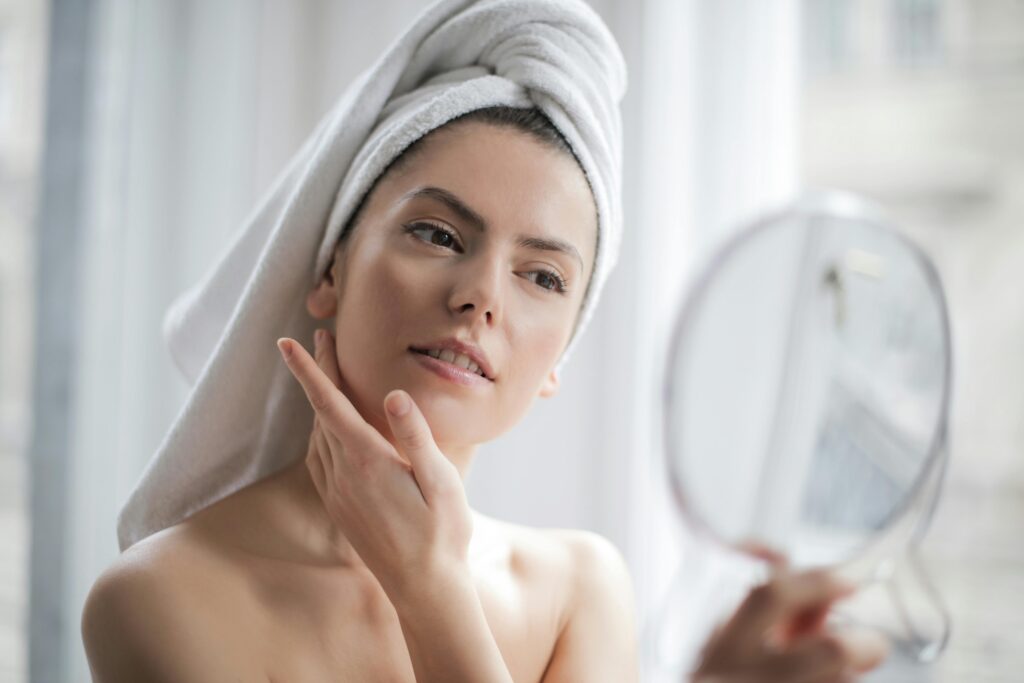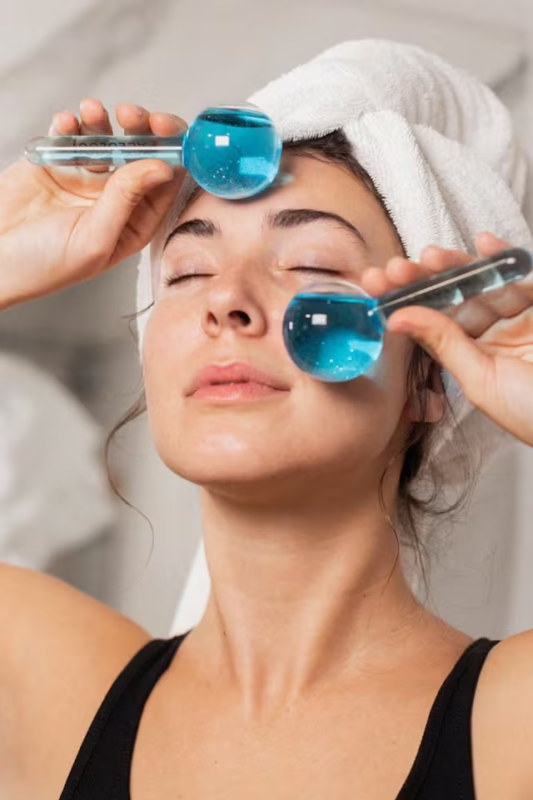
Introduction
Skincare is no longer just a beauty trend—it’s a science-backed necessity for maintaining healthy, radiant skin at every age. With an overwhelming number of products, ingredients, and routines available, understanding the fundamentals of skincare can help you build an effective regimen tailored to your skin type and concerns.
✔ The science of skin (structure, types, and functions)
✔ Essential skincare steps (cleansing, exfoliating, moisturizing, and protecting)
✔ Best ingredients for different skin concerns (acne, aging, hyperpigmentation)
✔ Day vs. night skincare routines
✔ Latest skincare trends (2025 innovations)
✔ Natural and dermatologist-approved tips
✔ Common skincare mistakes to avoid
By the end, you’ll have a personalized, expert-backed skincare plan for glowing, healthy skin.
1. Understanding Your Skin: The Science Behind Skincare

Skin Structure & Functions
Your skin is the body’s largest organ, consisting of three main layers:
- Epidermis (outer layer) – Protects against bacteria & UV rays.
- Dermis (middle layer) – Contains collagen, elastin, and sweat glands.
- Hypodermis (inner layer) – Stores fat and regulates temperature.
Skin Types & How to Identify Yours
- Dry Skin – Flaky, tight, prone to redness.
- Oily Skin – Shiny, enlarged pores, acne-prone.
- Combination Skin – Oily T-zone, dry cheeks.
- Sensitive Skin – Reacts easily to products (redness, irritation).
- Normal Skin – Balanced, few imperfections.
Quick Test: Wash your face, wait an hour—if it feels tight = dry; shiny = oily; both = combination.
2. The Ultimate Skincare Routine (Step-by-Step)
Morning Routine (Protection & Hydration)
- Cleanser – Gentle, pH-balanced (e.g., CeraVe Hydrating Cleanser).
- Buy Garnier Micellar Cleansing Water Gentle face Cleanser & Makeup Remover
- Toner – Restores pH (avoid alcohol-based).
- Buy L’Oreal Paris Age Perfect Smoothing Vitamin C Refreshing Toner
- Serum – Vitamin C (brightening), Hyaluronic Acid (hydration).
- Buy Aliver Vitamin C Anti-Aging Serum
- Moisturizer – Lightweight for day (gel-based if oily).
- Buy CeraVe Hydrating Hyaluronic Acid Serum Moisturising
- Sunscreen – SPF 30+ (non-negotiable!)
- Buy CeraVe SPF30 Moisturizing Mineral Sunscreen
Night Routine (Repair & Renewal)
- Double Cleanse – Oil-based cleanser first (removes makeup), then water-based.
- Buy NIVEA Double Effect Waterproof Eye Make-Up Remover
- Exfoliant (2-3x/week) – AHAs (glycolic acid) or BHAs (salicylic acid).
- Buy Ziaja Jeju Micro-Exfoliating Face Paste for Skin Imperfection
- Treatment Serums – Retinol (anti-aging), Niacinamide (acne control).
- Buy ADVANCED RETINOL SERUM with Vitamin C, Hyaluronic Acid Anti-Aging
- Eye Cream – Caffeine (puffiness), Peptides (wrinkles).
- Buy Cerave Anti-Aging Eye Cream for Wrinkles with Caffeine
- Night Cream – Thicker moisturizer (ceramides for barrier repair).
- Buy Moisturising Night Cream (50ml), 24 Hour Overnight Moisturising Cream
Weekly Treatments
- Face Masks – Clay (oily skin), Hydrating (dry skin).
- Buy 24K Gold Gel Collagen Facial Masks, Face Mask
- Chemical Peels (1x/week) – For hyperpigmentation.
- Buy Glycolic acid 50% Chemical Peel 100% Pure! Acne-Scars-Wrinkles, anti aging
- Dermaplaning (optional) – Removes peach fuzz for better absorption.
- Buy EYEBROW RAZOR SET Dermaplanning Remover Brow Razor Shaver Face Razors
3. Best Skincare Ingredients for Every Concern
| Skin Concern | Best Ingredients | Product Examples |
|---|---|---|
| Acne | Salicylic Acid, Benzoyl Peroxide, Tea Tree Oil | Paula’s Choice 2% BHA |
| Aging/Wrinkles | Retinol, Peptides, Vitamin C | The Ordinary Retinol 0.5% |
| Dry Skin | Hyaluronic Acid, Ceramides, Squalane | CeraVe Moisturizing Cream |
| Hyperpigmentation | Vitamin C, Niacinamide, Alpha Arbutin | SkinCeuticals C E Ferulic |
| Redness/Rosacea | Centella Asiatica, Azelaic Acid | Dr. Jart+ Cicapair Cream |
Pro Tip: Always patch test new ingredients to avoid irritation!
4. 2025 Skincare Trends & Innovations

1. Skin Barrier-Focused Care
- Trend: Repairing the moisture barrier with ceramides and fatty acids.
- Why? Over-exfoliation and harsh products weaken skin.
2. Blue Light Protection
- Trend: SPF isn’t enough—antioxidants (vitamin C, ferulic acid) defend against screen-induced damage.
3. Probiotic Skincare
- Trend: Balancing skin microbiome with prebiotics & postbiotics.
4. At-Home Devices
- Trend: LED masks, microcurrent tools, and DIY derma rollers.
5. Sustainable & Refillable Packaging
- Trend: Brands like Biossance, Tata Harper leading eco-friendly skincare.
5. Common Skincare Mistakes to Avoid
❌ Over-Exfoliating – Causes redness and sensitivity.
❌ Skipping Sunscreen – Leads to premature aging.
❌ Using Too Many Actives – Retinol + Vitamin C + AHA = irritation.
❌ Sleeping with Makeup On – Clogs pores, causes breakouts.
❌ Not Changing Products Seasonally – Skin needs differ in summer vs. winter.
6. Dermatologist-Approved Tips for Glowing Skin
✔ Drink More Water – Hydration starts from within.
✔ Change Pillowcases Weekly – Prevents bacterial buildup.
✔ Eat Skin-Friendly Foods – Avocados, berries, nuts.
✔ Get Enough Sleep – Skin repairs itself at night.
✔ Manage Stress – Cortisol triggers breakouts.
7. FAQs (Frequently Asked Questions)
Q: How long does it take to see skincare results?
- A: 4-6 weeks (except sunscreen, which works immediately).
Q: Can I mix retinol and vitamin C?
- A: Yes, but not at the same time (use vitamin C in AM, retinol in PM).
Q: Is natural skincare better?
- A: Not always—some natural ingredients (essential oils) can irritate. Science-backed formulas work best.
Conclusion: Your Personalized Skincare Plan
Building an effective skincare routine doesn’t require 10+ products—just the right ones for your skin type and concerns.
Key Takeaways:
✅ Know your skin type before buying products.
✅ Stick to basics first (cleanser, moisturizer, SPF).
✅ Introduce actives slowly (retinol, acids).
✅ Protect your barrier—overdoing it causes damage.
✅ Stay consistent—skincare is a long-term commitment.
Ready to glow? Start with a simple routine, track progress, and adjust as needed. Your skin will thank you!

